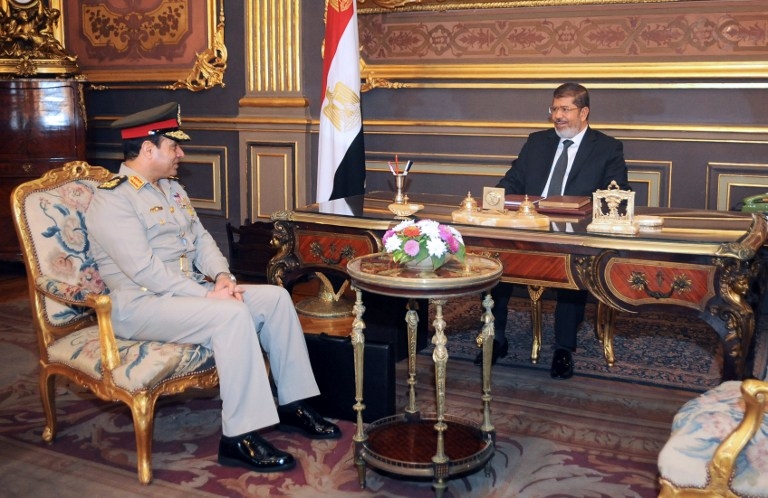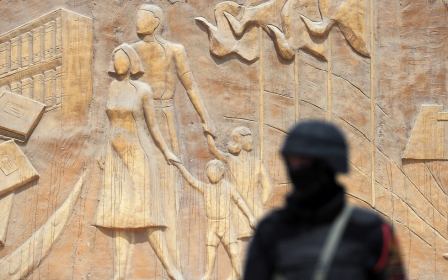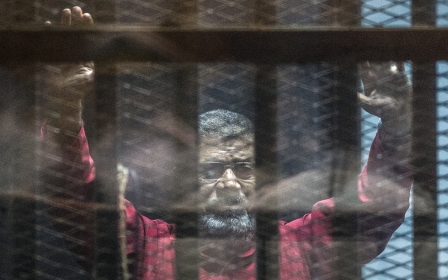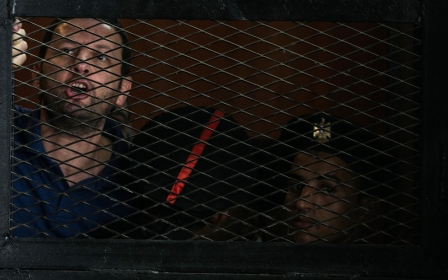Morsi vs Sisi: Who really supported the plight of Palestinians?

“We will never leave Gaza on its own,” said Mohamed Morsi, the ousted Egyptian president, during the brutal offensive of Israel in 2012. He denounced Israel’s bellicosity labelling it as “a blatant aggression against humanity”. Urging the cessation of the onslaught against Palestinian civilians, he vehemently reiterated: “The Israelis should know that Egypt today is completely different from Egypt yesterday.”
Just a couple of days ago Morsi, the first democratically elected president in the history of Egypt, was sentenced to 40 years in prison, just a year after an Egyptian court upheld the death sentence imposed on him over a ridiculous slew of charges.
For the Gazans, it is a bitter comparison between two diametrically opposed Egyptian regimes. While Abdel Fattah el-Sisi’s Egypt doesn’t only bow to Israeli and US pressure to isolate the Gaza Strip, it also recommends further sanctions and means of subjugation. Morsi relentlessly worked hard to ease the strangling conditions and the inhumane siege imposed on the people of the coastal enclave for more than 10 years. In the orphan year of his governance, he alleviated travel restriction for Palestinians across the Rafah crossing in southern Gaza. Morsi stood firm in his reluctance to compromise with Israel’s atrocities.
On the contrary, since Sisi took power after a brutal military coup, Egypt has unequivocally buttressed Israel’s extremist government against neighbouring Gaza. Bizarrely, during the latest Gaza war, Azza Sami, deputy chief editor of Egypt’s most read and government-owned Al-Ahram newspaper, overtly applauded Israel’s prime minister: “Thank you Netanyahu, and May God give us more leaders like you so that we can destroy Hamas.”
Sisi's response to the latest Gaza war was undoubtedly catastrophic. He tightened the borders with the beleaguered embattled enclave. He reportedly conspired, as a one-sided mediator, to prolong Gaza's bloodiest war by blackmailing the resistance factions and embracing Palestinian President Mahmoud Abbas, who was desperately keen to avenge Hamas. He also took advantage of Egypt’s geopolitical clout to refrain any Turkish or Qatari mediation to end the war.
In comparison, Morsi promptly responded to the Israeli aggression in 2012. He immediately summoned Egypt’s ambassador from Israel, called for an emergency session of the United Nations Security Council and instructed an immediate convening of the Arab League. He also opened the Rafah crossing to receive and treat Gazan casualties on the Egyptian side of the border. Most importantly, in an unprecedented move, he dispatched his prime minister, Hisham Qandil, to visit the Gaza Strip during the war. Eventually, his diplomatic measures succeeded in bringing a lull in tensions and ultimately brokered a ceasefire in less than seven days.
In the 50-day war of 2014, Sisi orchestrated a truce which was totally favourable to Israel. It empowered Israel to dictate its conditions of when and how to ease the embargo on Gaza. Egyptian mediators were literally ruthless in their attempts to impose a unilateral ceasefire that was coordinated only with Israel, and when Hamas understandably flinched, Israel intensified its aggression using the excuse of Hamas intransigence. Thus the flaunted Egyptian proposal to halt atrocities paved the way for Israel to savagely escalate its crimes against humanity in the Gaza Strip through massive ground incursions.
Eventually, the regime of Sisi engaged resistance factions in a ceasefire proposal under which Egypt would permit building materials to enter Gaza. However, the Sisi regime appeared disinclined to make any concession in the opening of the Rafah border crossing which remained mostly closed, with only sporadic transitory openings to permit the entry of wounded Gazans.
Would Morsi have been able to defuse the current blockade? Definitely yes. Under Morsi’s government, his advisor for development, Ahmed Omran, proclaimed that there were plans to bolster bilateral trade exchange by launching a series of projects in the fields of agriculture and olive industries. If those projects had started, Gaza would not be in such need of the tunnels to smuggle its food and medicine.
In contrast, the Sisi regime says that jihadists who have shattered the Sinai Peninsula with armed assaults get training and weapons from the Gaza Strip, supporting its claims with allegations by the Palestinian president in an interview with Egyptian newspaper Al-Akhbar. Ironically, Mahmoud Abbas publicly provided cover for Sisi, who was desperate to suffocate Gaza and destroy all the tunnels.
Abbas in that interview said thanks to the tunnels, hundreds of Gazans have become millionaires by smuggling weapons, drugs, cash and equipment to forge documents. Abbas went further to say that he’d recommended previously flooding the tunnels and punishing the households that contain tunnel entrances or exits.
It’s no secret that Abbas is notoriously averse to Gaza and its people and he abjectly took advantage of the Egyptian mainstream media’s deliberately fabricated surge of hatred toward Gaza to grudgingly incite besieging and even attacking Hamas, the offshoot of the banned Muslim Brotherhood.
Though unable to legally or publicly substantiate the claims, the Egyptian army incessantly declares that Ansar Bait al-Maqdis, a jihadist extremist militant group based in the Sinai Peninsula, receives its arms from Gaza via the tunnels. Subsequently, they flooded the tunnels and completely destroyed them, clearing a strip up to half a kilometer wide along the border in a bid to destroy smuggling tunnels into Gaza and demolish the homes of Egyptians and Palestinians located along the border.
The Egyptian generals’ allegations don’t hold water: Egypt’s intelligence services are well aware that most of the heavy arsenal in the hands of the militants in Sinai are smuggled from Libya. Thus, flooding the tunnels caused no harm to the militants’ capabilities but undeniably inflicted needless damage to the suffering Palestinian enclave.
Abbas and Sisi’s alleged reasons are merely slanderous lies because Sisi’s Egypt is able to devise thousands of methods to eliminate tunnel smuggling without their capricious annihilation of Egyptian and Palestinian habitats in the border districts.
Times have changed, and Morsi isn't around to help mitigate the ongoing Israeli-Egyptian blockade. Egypt's first democratically elected leader was toppled for many reasons: the lead among them was definitely his stance toward Gaza and his uncompromising attitude to the suffocating of his neighbours. He simply didn’t accept the role of being a watchdog in Israel’s backyard.
Unlike the way his opponents tried to portray him, Morsi, a real statesman, repeatedly endorsed Egypt’s commitments and previous agreements; he pledged his adherence to the 1979 Israel-Egypt peace treaty and even during times of war, he maintained channels of communication with Israel and the United States. The then US Secretary of State Hilary Clinton explicitly appreciated Morsi’s efforts to conclude a truce, saying: “We appreciate President Morsi’s personal leadership and Egypt's efforts thus far.” What a bizarre stance when the now US presidential candidate doesn't dare to condemn Egypt for putting Morsi behind bars, basically because her administration is complicit in Sisi’s crimes.
There is little doubt that the so-called international community is completely complicit with Israel in keeping the “Arab axis of moderation”, headed by tyrants and dictators who only excel in suppressing their nations and meekly accepting Western orders.
Sisi’s Egypt is an unreliable broker during any future Gaza-Israel conflict and an erratic mediator who would definitely fail to mediate reconciliation talks between the two rival Palestinian groups, Fatah and Hamas.
It’s a fatal flaw in international policy to allow such a brutal and weak regime to take the helm of such a strategic state; the retreat of Egypt’s diplomatic role will complicate the situation in the Middle East during the inevitable moments of conflagration to come.
- Ahmed al-Burai is a lecturer at Istanbul Aydin University. He worked with BBC World Service Trust and the LA Times in Gaza. He is currently based in Istanbul and mainly interested in Middle East issues. You can follow him on Twitter @ahmedalburai1
The views expressed in this article belong to the author and do not necessarily reflect the editorial policy of Middle East Eye.
Photo: The then Egyptian President Mohamed Morsi meeting with then Defence Minister General Abdel Fattah al-Sissi at the Presidential Palace in Cairo on 1 September, 2012 (AFP/Egyptian Presidency).
New MEE newsletter: Jerusalem Dispatch
Sign up to get the latest insights and analysis on Israel-Palestine, alongside Turkey Unpacked and other MEE newsletters
Middle East Eye delivers independent and unrivalled coverage and analysis of the Middle East, North Africa and beyond. To learn more about republishing this content and the associated fees, please fill out this form. More about MEE can be found here.





